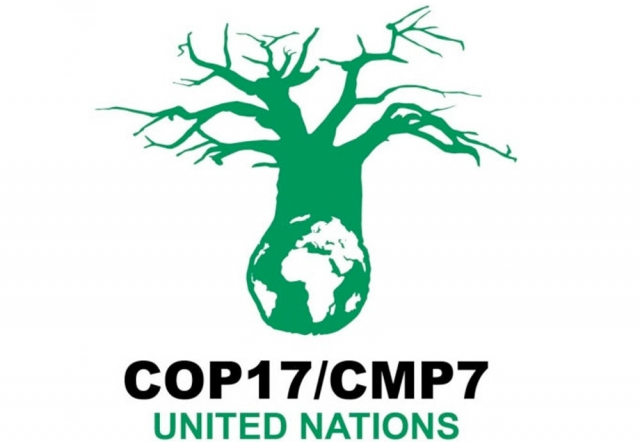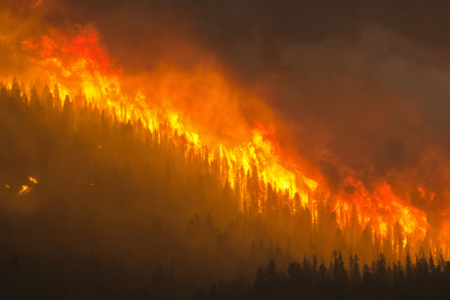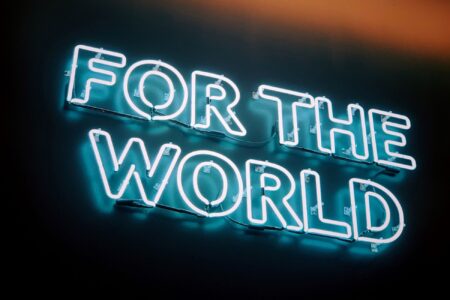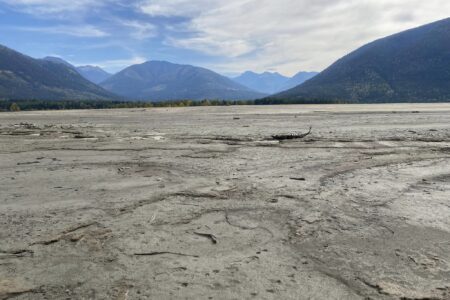The state of climate change negotiations at COP 17
By Richard Matthews
Although progress seems unlikely at COP 17, failure is not an option.
UN Secretary General Ban Ki-moon is warning participants at the deadlocked climate talks about the importance of finding solutions.
“It would be difficult to overstate the gravity of this moment,” Ban said “Without exaggeration, we can say: the future of our planet is at stake – people’s lives, the health of the global economy, the very survival of some nations.”
Despite the obvious evidence for global warming, the world cannot seem to find the right formula to agree on a binding treaty at COP 17 in Durban.
Global warming-causing greenhouse gas emissions continues to escalate, increasing beyond the worst predictions of the UN’s climate experts. Carbon dioxide concentrations have increased by 39 percent since the start of the industrial era in 1750.
China Offers Some Hope
Although much of the news coming out of Durban is bleak, China’s position offers some room to hope. China is rightly criticized for being the world’s biggest carbon emitter, but at COP 17, the country has emerged as an unlikely hero. Chinese delegation head Xie Zhenhua said China might be willing to sign a binding agreement for reducing emissions post-2020.
Xie told reporters that “China is open,” to the possibility of an international binding agreement. According to booklet at the country’s official pavilion, China is interested in “Working hard to tackle climate change.”
These claims are more than just hot air as China’s new five-year government plan makes the country a global leader in green growth and low-carbon initiatives. However, China has repeatedly stated that as a developing nation, with no historical responsibility for carbon emissions, it cannot be held to the same standards as industrialized countries. “China will shoulder the responsibility that is appropriate to its development,” Xie said.
South African international relations minister Maite Nkoana-Mashabane said “China is laying its cards on the table. Other negotiators will be laying the cards on the table and work then gets escalated. And that is what makes us hopeful we are moving in the right direction,” she said.
Although there are very low expectations for the outcome at COP 17, some optimism remains.
However unlikely, it is not impossible for developed and developing countries to compromise and reach an agreement on equitable and enforceable targets to reduce greenhouse gas emissions.
Ban Ki Moon said everyone had to be “realistic” about the chances of a breakthrough in Durban.
“It may be true, as many say: the ultimate goal of a comprehensive and binding climate-change agreement may be beyond our reach, for now,” Ban said. “Yet let me emphasize: None of these uncertainties should prevent us from making real progress here in Durban.”
“We are in Durban with one purpose: to find a common solution that will secure a future to generations to come,” said Maite Nkoana-Mashabane, South Africa’s international relations minister who is chairing the summit.
Figueres, quoting Mandela’s words about the difficulty of defeating apartheid said, “It always seems impossible until it is done.”
Ongoing Resistance from Wealthy Countries
In her opening speech for COP 17, Christiana Figueres, the Executive Secretary of the United Nations’ Framework Convention on Climate Change (UNFCCC), highlighted the importance of industrialized countries committing to cut greenhouse gas emissions, pointing to the devastating effects of climate change in developing countries. “Future commitments by industrial countries to slash greenhouse gas emissions is the defining issue of this conference.” Figueres said.
Despite what Figueres said, developed countries do not appear to be listening to her advice. The global economic crisis is causing wealthier nations to shy away from the Green Climate Fund intended to help poorer nations that are badly affected by climate change, and yet least responsible for it.
The Durban talks are also being impeded by the continuing refusal of key industrialized countries to commit to slashing greenhouse gas emissions, a necessary step to keep the rate of global warming below the 2 degrees Celsius guardrail, an internationally agreed upon target.
The Kyoto Protocol is the only emissions reductions treaty we have and it is set to expire in 2012. The United States, Japan, Russia and Canada do not want to renew the protocol. Britain and the EU are trying to broker a compromise, which would renew the protocol with a legally binding framework by which each country would be committed to take action on emissions.
The US Position
The U.S. is refusing to sign on to a second commitment period of the Kyoto Protocol without emissions reductions from China and India. For the U.S. to agree, all countries must be involved and there can be “no trap doors, no Swiss cheese,” said Todd Stern, the US chief envoy in Durban. “In order for there to be a legally binding agreement that makes sense, all the major players are going to have to be in.”
The U.S. is resistant to the Green Climate Fund and their delegates are reportedly pushing for “cooptation of climate financing mechanisms,” meaning they want some financing to come from corporations and international financing institutions.
India Opposing Progress
India has emerged as a leading opponent to a binding treaty at the UN Climate Conference. India is the world’s third largest carbon emitter and the country’s C02 emissions are now growing at a rate of more than 9 percent a year. At COP 17, India has made it clear that it is choosing economic growth over efforts to reduce emissions.
India has joined with other emerging economies in advocating a renewal of the Kyoto Protocol. Under this treaty, developing nations like India and China have no obligations to make cuts to emissions and all the onus is put on Western industrialized countries.
Canada’s Position makes it a Pariah
Canada, which has next to no presence at the summit, is being strongly criticized at the UN summit for failing to work on global climate change issues. Archbishop Tutu and other prominent Africans signed a petition against Canada, published as an ad in ECO, a daily newsletter at the conference, urging Canada to take action on climate change. ”Now is the time for Canada to tackle climate change, which will impact millions of people, instead of supporting multinational oil companies,” the ad said.
“Canada, you were once considered a leader on global issues like human rights and environmental protection. Today you’re home to polluting tar sands oil, speeding the dangerous effects of climate change. For us in Africa, climate change is a life and death issue,” it said.
China’s official Xinhua news agency said Canada is “setting a bad example” to other developed countries. South Africa’s Eyewitness News said Canada has “moved from hero in defending human rights to zero on environmental protection.”
Canada was the recipient of the “Fossil of the Day”, an award that is given by the group Climate Action Network to countries said to be blocking progress on negotiations. On an index released by a German nonprofit group, Canada ranks 54th, two spots below the U.S., for failing to do enough to prevent climate change.
The Costs of Climate Change
The costs of reducing emissions are frequently cited as reasons to do nothing, however these assessments fail to factor the much greater costs of climate change if left unchecked. To illustrate consider the costs of climate change for Canadians. Through its inaction in Durban, Canada’s ruling Conservatives are imposing huge costs on Canadians. According to a new report, climate change will cost Canadians about $5 billion a year by 2020 and those costs could grow to as much as $91 billion a year by the 2050s.
In addition to increased health costs, the report estimates that global warming will lead to between five and 10 additional deaths per 100,000 people per year by 2050.
“Climate change will be expensive for Canada and Canadians,” says the September 2011 report from the National Roundtable on the Environment and the Economy. “Increasing greenhouse-gas emissions worldwide will exert a growing economic impact on our own country, exacting a rising price from Canadians as climate change impacts occur here at home,” the report concludes.
The research reveals that the longer the effects of climate change are ignored, the costlier they become. “Our modeling … shows there is a risk those costs could not be just higher, but much higher,” the report adds. “Getting global emissions down is both in Canada’s economic and environmental interest,” said David McLaughlin, president of the roundtable.
A Binding Agreement on Climate Change is a Matter of Life and Death
To help foster progress member states at COP 17 need to remember that finding a binding agreement on climate change is an immediate matter of life and death. As island states remind us coastal flooding will cause some nations to completely disappear. Failure to address climate change has already resulted in deadly extreme weather and agricultural shortfalls. Even greater drought, famine, flooding and extreme weather events can be expected to further decrease agricultural yields which will make it impossible to feed the world.
Emission increases are causing global temperature rises and when the growing population is factored into the equation, the earth’s carrying capacity will be exceeded by human demands resulting in mass starvation.
“For most people in the developing countries and Africa, climate change is a matter of life and death,” South African President Jacob Zuma said at the opening of the conference.
“Africa has contributed least to the buildup of greenhouse gases globally, but will be in the frontline of the adverse effects of climate change,” said Edna Molewa, South Africa’s minister of environmental affairs at the start of the summit. “Many Africans unfortunately already have firsthand experience of the suffering that climate change can cause,” she said, adding: “Finding a workable way forward is the defining issue of this conference.”
Africa is not the only place where climate change is taking a toll. In the Arctic, climate change is already making life very difficult for the Inuit. Climate change is causing ice to melt unexpectedly and the snows to come late. This year thinning ice almost killed a man from Arviat when his snowmobile broke through the ice causing him to fall into the frigid waters below.
The absence of ice needed to hunt seals is causing polar bears to starve to death and in the absence of action on climate change; humans can expect the same fate.
The lack of effort to seriously pursue solutions to climate change is criminal, as stated by Zwelinzima Vavi, president of the Congress of South African Trade Unions: “Durban is a crime scene, KwaZulu-Natal is a crime scene, the African continent is a crime scene, the whole world is a crime scene.”
People are Demanding Climate Justice
Despite the lack of progress in Durban, people are refusing to accept failure. Protests around the world are increasingly demanding climate justice.
On Saturday December 3, on what was called the “Global Day of Action“, about 20,000 people from all over the world took to the streets to protest the lack of progress at climate change negotiations.
As stated by Global Day of Action subcommittee convener Desmond D’Sa, “today will be the beginning of a strong movement that is going to challenge the rich nations of the world.”
“We march today to show our outrage. We want to give the ministers, who will arrive next week, a clear message: You cannot continue to make excuses,” said Action Aid international climate justice coordinator Harjeet Singh
A march and rally in Manilla is just one example of scores of protests demanding climate justice. The poor are in fact the hardest hit by this climate change, said Nanay Leleng, national president of Kalipunan ng Damayang Mahihirap (Kadamay), as she led protesters who marched to the US Embassy in Manila.
The ILPS, through the office of its chairperson, said in a statement, “those who pay lip service to environmental concerns deliberately refuse to come up with a binding international agreement on climate change, the monopoly capitalists want only to continue its control, exploitation and consumption of world resources at the expense of the impoverished people and ravaged environments of the world.”
Ms Figueres told protesters in Durban: “You know where we stand, here with you.” To make this more than a hollow statement, member states must also stand with protestors and make a consorted effort to make progress before the end of COP 17 on December 9.
The world is increasingly united in its demand that leaders reach an agreement on environmental issues. “We demand urgent and strong action on climate change. We can’t just keep talking and keep wasting time,” Singh said. It is time to listen to the voices of ordinary people not polluters.
From Global Warming is Real: Climate – Energy – Sustainability
Richard Matthews is a consultant, eco-entrepreneur, green investor and author of numerous articles on sustainable positioning, eco-economics and enviro-politics. He is the owner of THE GREEN MARKET, a leading sustainable business blog and one of the Web’s most comprehensive resources on the business of the environment. Find The Green Market on Facebook and follow The Green Market’s twitter feed.
Related articles
- What will it take for Durban climate change conference to end positively? | Kelly Rigg (guardian.co.uk)
- COP17 UnMerry-Go-Round: US Delays, Canada Obstructs, China Willing To Act, But India Won’t (treehugger.com)
Image credit: SmartMeme

























Comments